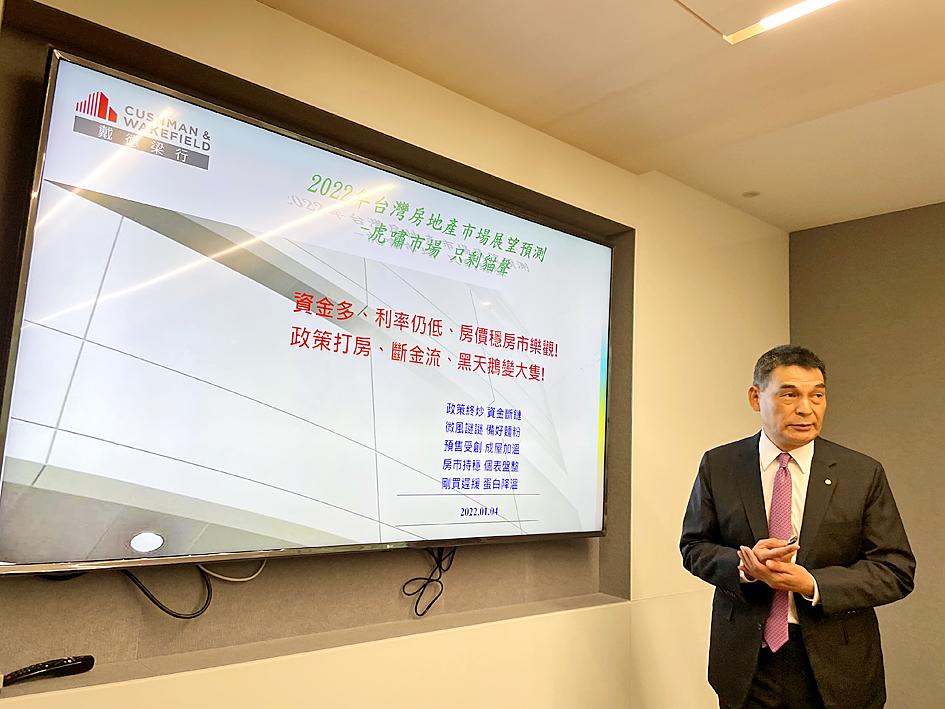Commercial property transactions last quarter spiked 40.8 percent from three months earlier to NT$46.3 billion (US$1.67 billion), underpinned mainly by demand for industrial properties in northern Taiwan, Cushman & Wakefield Taiwan said yesterday.
Property funds at home and abroad shored up the market as seen in the purchase of plants in Taoyuan by Microsoft Taiwan Corp and the acquisition of plants in Taichung by Micron Technology Inc amid ongoing global supply chain realignments, the property service provider said.
For the whole of last year, commercial property deals climbed 14 percent year-on-year to a record NT$152.8 billion, with factories and office space accounting for 66.5 percent, Cushman & Wakefield Taiwan said.

Photo: Hsu Yi-ping, Taipei Times
Industrial properties alone expanded 42 percent annually, with most transfers concentrated in Hsinchu or northward to meet self-occupancy needs, the company said.
Demand for industrial properties is expected to remain strong this year, because conglomerates like to have subsidiaries close to enhance operating efficiency, it said.
The supply of office buildings in and around Taipei is quite limited, explaining why new complexes are in demand, Cushman & Wakefield Taiwan said.
Likewise, land deal activity would remain high this year, although transactions last year softened to NT$289.3 billion due to a lack of transfers in Taipei’s central business districts, it said.
Prices for land near Taiwan Taoyuan International Airport, and Taichung’s upcoming business districts and MRT stations are likely to rise, it said.
Developers are keen to build up land stock in residential and commercial areas, reflecting optimistic views on their part, despite credit controls, it said.
Cushman & Wakefield Taiwan managing director Billy Yen (顏炳立) said that housing prices are unlikely to fall in the foreseeable future, given the mounting cost of land and building materials.
Housing prices increased most evidently for presale projects in second-tier locations last year, which would drive buyers to shift focus back to existing homes in central areas this year, Yen said.

UNCERTAINTY: Innolux activated a stringent supply chain management mechanism, as it did during the COVID-19 pandemic, to ensure optimal inventory levels for customers Flat-panel display makers AUO Corp (友達) and Innolux Corp (群創) yesterday said that about 12 to 20 percent of their display business is at risk of potential US tariffs and that they would relocate production or shipment destinations to mitigate the levies’ effects. US tariffs would have a direct impact of US$200 million on AUO’s revenue, company chairman Paul Peng (彭雙浪) told reporters on the sidelines of the Touch Taiwan trade show in Taipei yesterday. That would make up about 12 percent of the company’s overall revenue. To cope with the tariff uncertainty, AUO plans to allocate its production to manufacturing facilities in

TAKING STOCK: A Taiwanese cookware firm in Vietnam urged customers to assess inventory or place orders early so shipments can reach the US while tariffs are paused Taiwanese businesses in Vietnam are exploring alternatives after the White House imposed a 46 percent import duty on Vietnamese goods, following US President Donald Trump’s announcement of “reciprocal” tariffs on the US’ trading partners. Lo Shih-liang (羅世良), chairman of Brico Industry Co (裕茂工業), a Taiwanese company that manufactures cast iron cookware and stove components in Vietnam, said that more than 40 percent of his business was tied to the US market, describing the constant US policy shifts as an emotional roller coaster. “I work during the day and stay up all night watching the news. I’ve been following US news until 3am

COLLABORATION: Given Taiwan’s key position in global supply chains, the US firm is discussing strategies with local partners and clients to deal with global uncertainties Advanced Micro Devices Inc (AMD) yesterday said it is meeting with local ecosystem partners, including Taiwan Semiconductor Manufacturing Co (TSMC, 台積電), to discuss strategies, including long-term manufacturing, to navigate uncertainties such as US tariffs, as Taiwan occupies an important position in global supply chains. AMD chief executive officer Lisa Su (蘇姿丰) told reporters that Taiwan is an important part of the chip designer’s ecosystem and she is discussing with partners and customers in Taiwan to forge strong collaborations on different areas during this critical period. AMD has just become the first artificial-intelligence (AI) server chip customer of TSMC to utilize its advanced

Six years ago, LVMH’s billionaire CEO Bernard Arnault and US President Donald Trump cut the blue ribbon on a factory in rural Texas that would make designer handbags for Louis Vuitton, one of the world’s best-known luxury brands. However, since the high-profile opening, the factory has faced a host of problems limiting production, 11 former Louis Vuitton employees said. The site has consistently ranked among the worst-performing for Louis Vuitton globally, “significantly” underperforming other facilities, said three former Louis Vuitton workers and a senior industry source, who cited internal rankings shared with staff. The plant’s problems — which have not